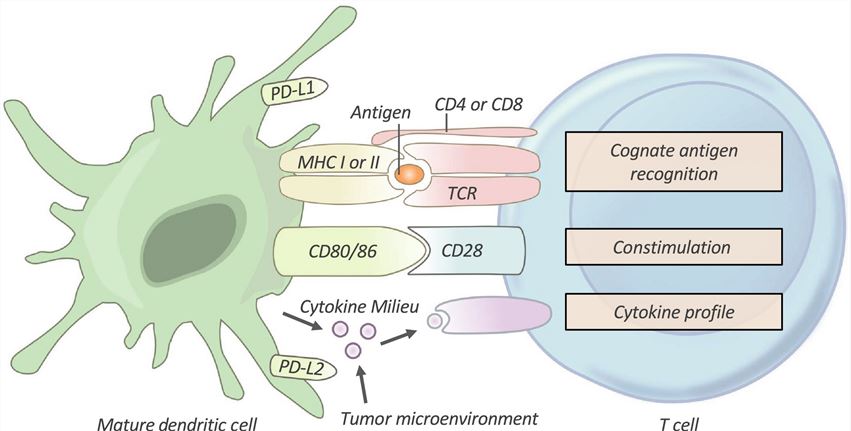T Cell Activation Analysis
Creative Biolabs offers optimal solutions for T-cell activation analysis to meet your project's needs. Customized solutions offer flexibility to meet a range of experimental needs and multiple methods to better meet practical needs. Our analysis facilitates quick identification of T-cell activation status to advance your research.
T-cell Activation
T-cell activation involves complex interactions and requires three signals.
-
Signal 1: T-cell receptor (TCR) signaling. The first signal is mediated by the interaction between TCRs and peptide/MHC complexes at the antigen-presenting cell (APC) surface.
-
Signal 2: costimulation. The costimulatory signal is provided by the interaction of coreceptors such as CD28 or CD4 with their counterparts in the APC.
-
Signal 3: inflammatory cytokines. T cell receives instructive cytokines from immune cells and the tumor microenvironment which dictate its phenotypic differentiation.
 Fig.1 T-cell Activation and identification.1
Fig.1 T-cell Activation and identification.1
Receiving only signal 1 without co-stimulation results in T cell unresponsiveness or energy, a process known as peripheral tolerance. Once a naive T cell finds the distinct antigen required for activation, an extensive proliferation of antigen-specific T cells is induced. After T-cell activation, a variety of signaling pathways are activated, leading to the expression of functional cell surface markers and the release of cytokines. Activated cells migrate to the periphery where killer T-cells identify infected cells and release toxic substances helper T-cells undergo further differentiation into subtypes.
T Cell Activation Analysis Services
-
Methods to Assess T-cell Activation
There are a lot of techniques to evaluate T-cell activation, including in vivo cytotoxicity, intracellular staining, activation markers, ELISpot, cytometric bead array (SBA), T-cell migration, etc. These assays are crucial to drive our understanding of T-cell activation and response. The selection of appropriate methods depends on your experimental T-cell types, setup and purpose. T cell activation can be commonly measured by assessing:
-
T cell proliferation;
-
Up-regulation of activation markers (e.g., CD154/CD40, CD137/4-1BB and IL2RA/CD25c);
-
Production of effector cytokines (IFN-γ, TNF-α).
Partner with Creative Biolabs, and we help you choose the optimal solution for your project. These methods can assess and quantify T-cell activation, allow for a greater understanding of how T cells react to certain stimuli and provide precise information for immune response monitoring. Our scientists can provide precise and consistent handling for repeatable results to reduce variations in assay performance and unreliable data.
As always, we are available for flexible discussions to see how we can collaborate and develop the next generation of cancer therapies. If you are interested in our services, please feel free to contact us to talk about your project.
Reference
-
Neeve, Samuel C., Bruce WS Robinson, and Vanessa S. Fear. "The role and therapeutic implications of T cells in cancer of the lung." Clinical & translational immunology 8.8 (2019): e1076. Distributed under Open Access license CC BY 4.0, without modification.
For Research Use Only | Not For Clinical Use


 Fig.1 T-cell Activation and identification.1
Fig.1 T-cell Activation and identification.1
 Download our brochure
Download our brochure